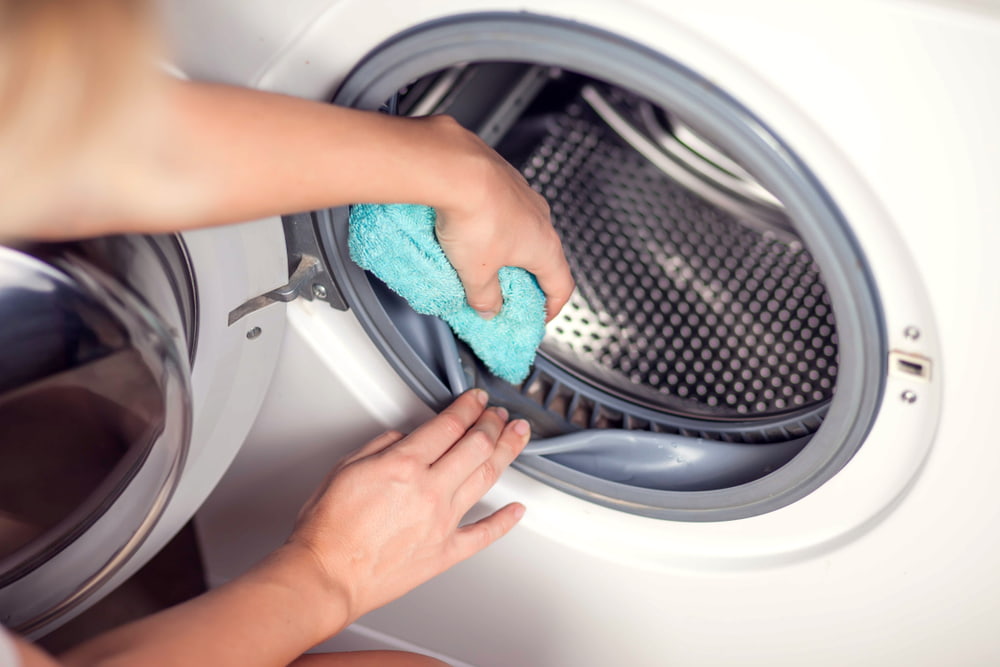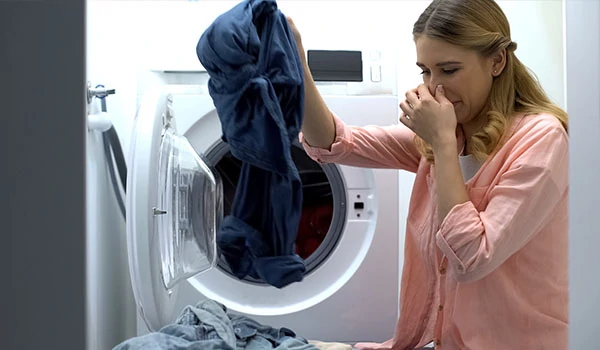Table of Contents
Washing machine smells can be a frustrating issue for many homeowners. These odors often come from mildew, soap buildup, and moisture trapped in the machine. Identifying the cause is the first step toward eliminating the unpleasant scents.
It’s essential for users to know that regular maintenance can prevent these odors from developing. A simple routine that includes cleaning the gasket, leaving the door ajar, and running a deep clean cycle can help keep the washing machine fresh. Understanding the reasons behind the smells and how to address them will lead to a cleaner and more efficient appliance.
By addressing these common problems, homeowners can enjoy fresher laundry and a more pleasant laundry experience. Recognizing the signs of a smelly washing machine is key to maintaining its performance and longevity.
Understanding Washing Machine Smells
Washing machine smells can indicate several issues. Common smells include those resembling sewage, rotten eggs, or dampness. These odors often signal a problem that needs addressing.
A sewage smell may come from a clogged drain or sewer line. This can lead to dirty water pooling in the machine. Regular maintenance can help prevent this problem.
If the machine smells like rotten eggs, this could be due to bacteria or mildew growth. This often occurs in moist areas or after using cold water frequently. Keeping the machine dry and clean helps prevent this odor.
Sometimes, a washing machine may smell bad after use. This can happen if residue from detergents or fabric softeners builds up. It is essential to clean the detergent dispensers regularly.
A damp smell might signal that moisture is trapped in the machine. This can result from leaving the door closed after a wash. Leaving the lid or door open after use allows the interior to dry out.
To keep odors at bay, users should establish good habits. Here are some steps to consider:
- Run a cleaning cycle monthly.
- Wipe the door and gasket after each use.
- Leave the lid open to promote airflow.
By following these tips, instances of unpleasant odors in washing machines can be reduced.
Preventative Maintenance for a Fresh-Smelling Washer

To keep a washing machine smelling fresh, regular maintenance is essential. Routine care can help prevent odor issues, such as stagnant water smell or dampness.
1. Leave the Door Open:
After a wash cycle, leaving the door ajar will allow air circulation. This helps to dry out any remaining moisture inside the drum and prevents mold growth.
2. Clean the Seal:
Wipe down the rubber seal around the door weekly. This area can trap water and detergent, causing unpleasant odors. A damp cloth and mild soap can work well for this task.
3. Run a Monthly Cleaning Cycle:
Running a cleaning cycle with vinegar or baking soda every month can help eliminate buildup. For example, pour two cups of white vinegar into the drum and run a hot water cycle to refresh the machine.
4. Check the Drain Filter:
Regularly inspect and clean the drain filter. A clogged filter can cause water to linger, leading to foul smells.
5. Use the Right Detergent:
Using too much detergent can lead to residue buildup. Check the instructions on the detergent package to ensure the right amount is used.
6. Minimize Stagnant Water:
After washing, ensure that all water has drained properly. If there is a stagnant water smell, it may be necessary to inspect the drainage system. Keeping the drain clean will help maintain freshness.
Deep Cleaning Techniques

Deep cleaning of a washing machine is essential to remove odors and buildup. Different techniques are required for top loaders and front loaders, each with specific steps to ensure effectiveness.
Top Loader Washing Machines
To clean a top loader, start by removing the detergent dispenser drawer. Soak it in warm water mixed with white vinegar for about 10 minutes to loosen any gunk. After soaking, scrub all crevices with a brush and rinse them thoroughly.
Next, fill the washing machine with hot water to the highest setting. Add 1-2 cups of white vinegar and run a complete wash cycle. This helps eliminate odors. Additionally, scrub the inner tub gently to remove any residue.
After the cycle, wipe down the lid, exterior surfaces, and around the tub. Leaving the lid open after use allows moisture to escape, reducing future odors.
Front Loader Washing Machines
Cleaning a front loader requires a few different steps. Begin by wiping the rubber door seal with a dry cloth. This area can trap water and detergent, leading to unpleasant smells.
Next, run a self-clean cycle if available. If not, run a hot wash cycle with 1-2 cups of white vinegar to thoroughly clean the drum. This method helps to remove mold and mildew.
Also, remember to clean the detergent dispensers regularly. Remove them and scrub them with warm, soapy water. Dry all parts fully before reassembling.
Lastly, after each load, wipe down the drum and gasket and keep the door slightly open to help air circulate.
Common Issues and Solutions
Washing machines can develop various odors. Understanding these smells helps in finding the right solutions.
Sewage Smell
If a washing machine smells like sewage, the issue could be a blocked drain. Debris or buildup in the drain hose may cause this odor.
Solution:
Check the drain hose for clogs.
Clean the hose to ensure proper drainage.
Rotten Eggs Smell
A washing machine that smells like rotten eggs often indicates bacterial growth. This can happen from moisture trapped inside.
Solution:
Run a cleaning cycle with a specialized washer cleaner.
Leave the door open after each use to let it dry thoroughly.
Mildew and Musty Smells
These smells are caused by trapped moisture and detergent residue.
Solution:
Regularly scrub the detergent dispensers and door seals.
Use a hot water cycle with vinegar to eliminate buildup.
General Maintenance Tips
Perform a deep cleaning of the washing machine monthly.
Ensure filters are clean and checked regularly to avoid clogs.
Implementing these solutions can help maintain a fresh-smelling washing machine and prevent unpleasant odors.
FAQs
How can you get rid of unpleasant washing machine smells?
To remove foul washing machine smells, it is recommended to run a cleaning cycle using hot water with vinegar. Cleaning the gasket and detergent dispensers also helps eliminate buildup. Regular maintenance ensures a fresher smell over time.
What causes a washing machine to emit a sewage-like smell?
A sewage-like odor often comes from stagnant water in the drain or trapped debris. This can happen if the drain hose is clogged or if leftover detergent accumulates. Cleaning the drain and washing machine components can help resolve this issue.
What are the effective methods for removing stagnant water scents in washing machines?
To remove stagnant water scents, they can run a hot wash cycle with vinegar or baking soda. This helps neutralize odors and kill bacteria. Regularly cleaning the filter and drain can also prevent these smells.
Why does my washing machine give off a rotten egg odor?
A rotten egg smell usually indicates the presence of hydrogen sulfide gas, often caused by bacteria in stagnant water. Cleaning the interior and ensuring proper drainage can help eliminate this odor. Running maintenance cycles with vinegar can also reduce the buildup that causes this smell.
Conclusion
Washing machine smells are typically caused by mildew, soap residue, and moisture buildup. Identifying the root cause and addressing it with regular maintenance, like wiping down the gasket and running monthly cleaning cycles with vinegar or baking soda, can prevent unpleasant smells. Simple steps, such as keeping the door open after each use, also help to keep the machine fresh.
By consistently following these practices, homeowners can not only eliminate foul odors but also extend the life of their washing machine. A clean, odor-free washer ensures better performance, making laundry day more pleasant and efficient.



